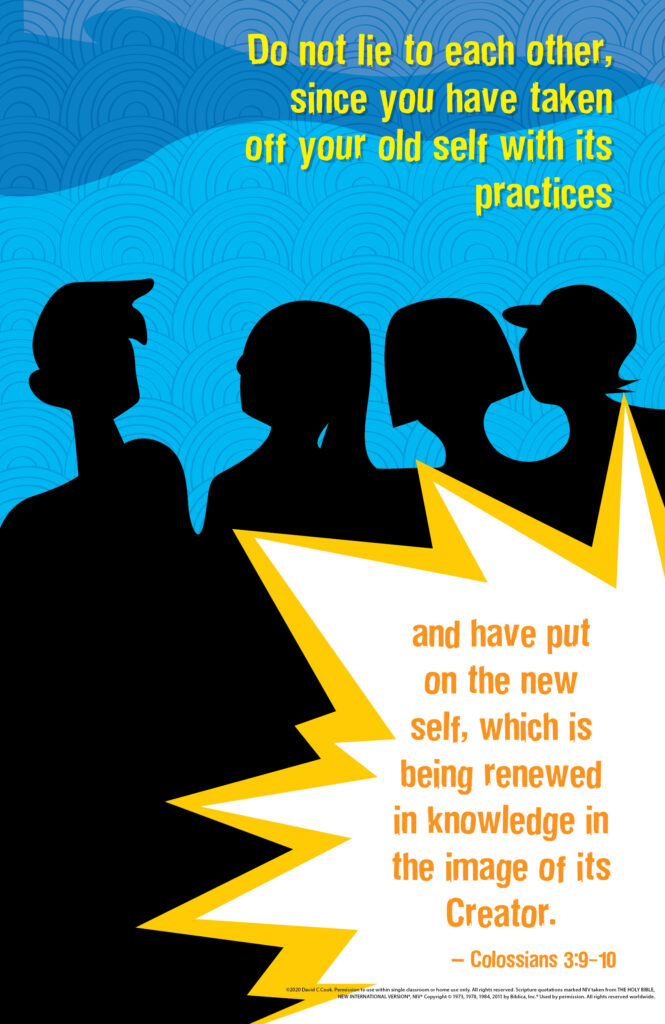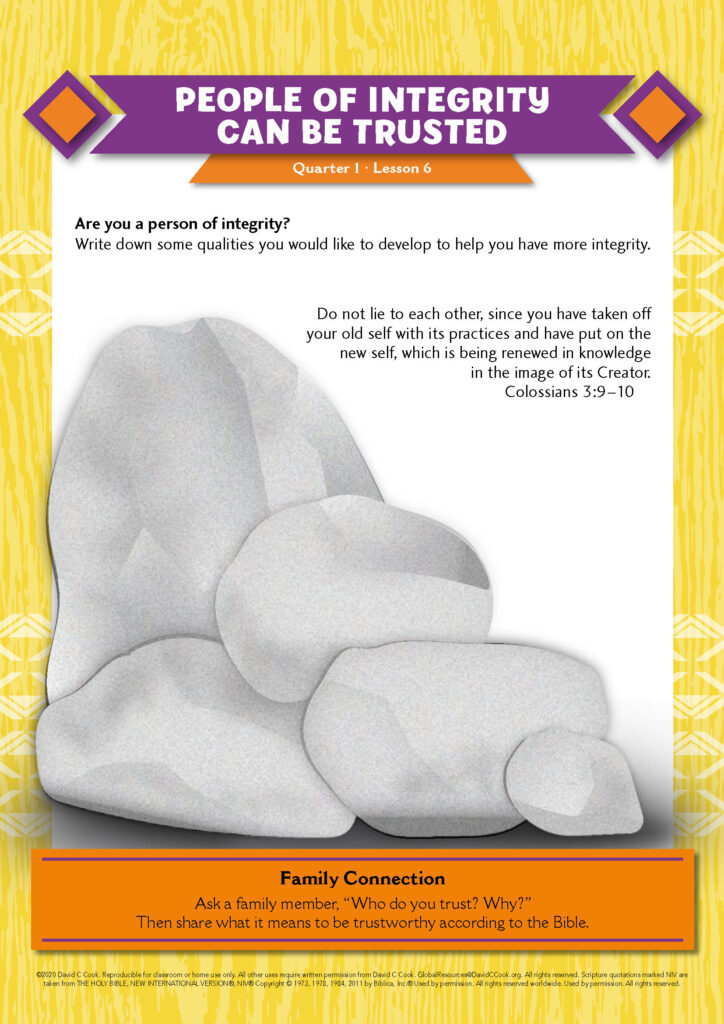During the lesson, the information for you to know is written in regular type, and what we suggest speaking or reading aloud to children is in bold. All resources for this lesson, including the Teacher Guide, Student Page, Family Connection Card, and other resources can be downloaded in a ZIP file by clicking on the following link:
In some lessons you will find "resource articles." These are articles written by experts from around the world to help equip you for your work with children and adolescents. Share them with parents or guardians if you consider it appropriate.
In everything set them an example by doing what is good. In your teaching show integrity, seriousness and soundness of speech that cannot be condemned, so that those who oppose you may be ashamed because they have nothing bad to say about us.
Titus 2:7–8
We live in a world where it can be hard to know who to trust. Government officials do not always act justly. People use others for their own advantage. Even a friend or family member can betray us. But God calls believers to a different standard.
As a teacher, you want to be trustworthy so your students can trust you with their problems. As you prepare to help your students see the importance of being trustworthy, remember that this is a characteristic that comes from the Lord, whose ways are completely just and true. God is faithful, and you can trust Him in every situation. Think of ways you can gain and keep your students’ trust. Ask God to show you if there is any area in which you have not been trustworthy. How can He help you to be more trustworthy and bring your students closer to Him?
Pray for God’s guidance as you seek to become a person who can always be trusted by others, including your students. Teach with integrity. Live with integrity. Love with integrity. Follow the example of the One who always taught, lived, and loved with integrity and who wants to transform your heart to be more like His.
Encourage the students to ask their family members, “Who do you trust? Why?” They can then share what it means to be trustworthy according to the Bible.
Teacher Tip: If possible, email or text the Family Connection Card to the families of your students.
Today we are going to talk more about integrity. A person with integrity is trustworthy because he or she does and says what is right.
Give each student a rock and a leaf, flower, or square of paper.
Think of a person who is very trustworthy. This can be a person you know or a type of person, such as a doctor or teacher.
Hold a rock in your left hand to represent this person. Ask the students to do the same.
A trustworthy person is like a rock—sturdy and dependable. Now think of a person who you believe cannot be trusted.
Hold a leaf, flower, or square of paper in your right hand to represent an untrustworthy person. Crumple and tear the leaf or paper. Ask the students to do the same.
Like these leaves, this kind of person is not dependable because his or her character can be crumpled or torn.
Allow students to share their thoughts.
Allow students to share their thoughts.
A person who has integrity can be trusted. Do you think it is possible to become trustworthy if you have been untrustworthy in the past? Let’s find out.
The students can discard their leaves, flowers, or squares of paper. Ask them to set aside the rocks for later in the lesson.
Read the story of Zacchaeus from Luke 19:1–9. Then discuss it with your students. If possible have your students read directly from the Bible, each reading 1 verse.
Jesus entered Jericho and was passing through. A man was there by the name of Zacchaeus; he was a chief tax collector and was wealthy. He wanted to see who Jesus was, but because he was short he could not see over the crowd. So he ran ahead and climbed a sycamore-fig tree to see him, since Jesus was coming that way. When Jesus reached the spot, he looked up and said to him, “Zacchaeus, come down immediately. I must stay at your house today.” So he came down at once and welcomed him gladly. All the people saw this and began to mutter, “He has gone to be the guest of a sinner.” But Zacchaeus stood up and said to the Lord, “Look, Lord! Here and now I give half of my possessions to the poor, and if I have cheated anybody out of anything, I will pay back four times the amount.” Jesus said to him, “Today salvation has come to this house, because this man, too, is a son of Abraham. For the Son of Man came to seek and to save the lost.”
Luke 19:1–9

Zacchaeus was a tax collector. In the time of Jesus, most tax collectors were dishonest. They collected taxes for the government and kept part of the money for themselves.
Jesus loves everyone, even those who are untrustworthy, and He wants to redeem everyone.
Jesus celebrated Zacchaeus’ decision and announced that Zacchaeus had been forgiven for his past untrustworthiness.
No matter what you may have done in the past, you can be renewed, or changed from the inside out, by trusting in and following Jesus. It is never too late to start living the way God wants you to, with integrity, and to become a person others can trust. Listen to this verse about saying what is true.
Do not lie to each other, since you have taken off your old self with its practices and have put on the new self, which is being renewed in knowledge in the image of its Creator.
Colossians 3:9–10

We do not lie anymore because, as Christians, God is changing us because we believe in Jesus.
Possible answer: it means that the Holy Spirit begins a process of changing us when we become Christians.
Earlier we talked about people we could trust and those we could not. Think about yourself. Are you a person others can trust? Are you more like the rock or more like the leaf? If you are more like the leaf, you can change, just like Zacchaeus. Jesus welcomes you to follow Him and be a person of integrity who does and says what is true.
Allow students to share their thoughts. Remind them not to share names; they should only share how the lack of integrity affects them.
Friends are very important. Good friends encourage us to live with integrity. Bad friends may encourage us to do things that are not pleasing to God—such as lying, cheating, gossiping, and harming our bodies with drugs and alcohol. Listen to what this verse says about friends:
Do not be misled: “Bad company corrupts good character.”
1 Corinthians 15:33
If we have integrity, we will surround ourselves with good friends we can trust and stay away from people who try to influence us to do bad things.
As a group, ask the students to make up situations where peers may want them to do something that lacks integrity. Then have them get into pairs to role-play these situations. One will try convince the other to do something wrong, and the other will resist. The student who resists should not only respond to the pressure but also convince the other not to do the wrong thing. After a few minutes, have them reverse their roles, choose a new situation, and role-play once again. This activity should take about 10 minutes.
Every day we make choices about doing what is right or doing what is wrong. Others may try to convince us to do wrong things. If we have integrity, we will listen to good friends and stay away from people who try to influence us to do bad things. Above all, if we have integrity, we will listen to God, who shows us how to be trustworthy in all situations.
Optional: If you are using the Student Pages, ask your students to complete the pages as they answer the discussion questions.

If you have not always been a person who can be trusted but would like to change, you can change. If you realize you spend time with people who do not have integrity, you can start spending time with friends you can trust, who have integrity and who will encourage you. Remember that only God can help you to live with absolute integrity. That is because He is the only One who is perfectly trustworthy. If you want to live with integrity or find friends with integrity, you can ask for His help.
I am putting my rock on the ground to show that I want to live with integrity. I am going to pray for God to help me to live the way He wants me to and that He will help me to find friends with integrity to lead me in the right direction. While I am praying, you can think about living with integrity. If you would like, you can pray, too. If you want to live with integrity, while we are praying, you can put your rock in the pile with mine.
Give students a few minutes of silence to think or pray about living with integrity and finding friends who have integrity. If they would like, they can place their rocks in the pile to show their commitment to living with integrity.
At the end of class, let students know you are available if they want to talk with you. Close your time with a blessing over your students based on Jude 1:24:
Blessing: May our trustworthy God, who is able to help you do what is right and say what is true, keep you from stumbling. May He surround you with people you can trust who will encourage you to do what is right.
Life on Life ©2020 David C Cook. Reproducible for home or classroom use only. All other uses require written permission from David C Cook [email protected]. All rights reserved.